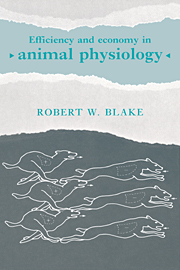Book contents
- Frontmatter
- Contents
- List of contributors
- Preface
- 1 Efficiency, effectiveness, perfection, optimization: their use in understanding vertebrate evolution
- 2 On the efficiency of energy transformations in cells and animals
- 3 Adapting skeletal muscle to be efficient
- 4 Efficiency and other criteria for evaluating the quality of structural biomaterials
- 5 Efficiency and optimization in the design of skeletal support systems
- 6 Efficiency in aquatic locomotion: limitations from single cells to animals
- 7 The concepts of efficiency and economy in land locomotion
- 8 Respiration in air breathing vertebrates: optimization and efficiency in design and function
- 9 Cardiac energetics and the design of vertebrate arterial systems
- 10 An evolutionary perspective on the concept of efficiency: how does function evolve?
- Index
10 - An evolutionary perspective on the concept of efficiency: how does function evolve?
Published online by Cambridge University Press: 03 October 2009
- Frontmatter
- Contents
- List of contributors
- Preface
- 1 Efficiency, effectiveness, perfection, optimization: their use in understanding vertebrate evolution
- 2 On the efficiency of energy transformations in cells and animals
- 3 Adapting skeletal muscle to be efficient
- 4 Efficiency and other criteria for evaluating the quality of structural biomaterials
- 5 Efficiency and optimization in the design of skeletal support systems
- 6 Efficiency in aquatic locomotion: limitations from single cells to animals
- 7 The concepts of efficiency and economy in land locomotion
- 8 Respiration in air breathing vertebrates: optimization and efficiency in design and function
- 9 Cardiac energetics and the design of vertebrate arterial systems
- 10 An evolutionary perspective on the concept of efficiency: how does function evolve?
- Index
Summary
ABSTRACT
The concept of efficiency is an explicit and useful vehicle for comparing the functioning of organisms and their component parts, and as such is an invaluable comparative yardstick that enables us (1) to assess function quantitatively, (2) to compare dissimilar taxa and physiological systems, and (3) to analyze the evolution of physiological systems. Efficiency is defined as the ratio of work output to chemical energy input. Efficiency should not be confused with the concepts of performance or effectiveness which measure the ability of organisms to execute behaviors. In many cases performance is a more appropriate measure of function at the organ or whole organism level than efficiency where appropriate inputs and outputs may be hard to define.
From an evolutionary perspective, efficiencies should be measured relative to an outgroup clade, not merely in comparison to the most easily obtainable species. Three major questions in the evolution of function are posed and a general phylogenetic method for investigating these questions is considered. First, how well integrated are organisms: to what extent is the functioning of subsystems at various levels of organization within organisms matched? Secondly, is there a tradeoff between efficiency and the ability to regulate function in organisms? Thirdly, does evolution optimize efficiency, and what are the evolutionary consequences of changes in efficiency? There is a tendency to believe that changes in efficiency may be causally related to evolutionary ‘success’, but considerable caution is needed in assigning historical importance to a presumed change in efficiency: historical hypotheses of functional significance are difficult to test. The integration of quantitative analyses of organismal function with comparative and phylogenetic analyses will contribute to our understanding of how physiological systems evolve.
- Type
- Chapter
- Information
- Efficiency and Economy in Animal Physiology , pp. 169 - 184Publisher: Cambridge University PressPrint publication year: 1992
- 2
- Cited by



